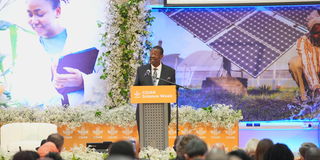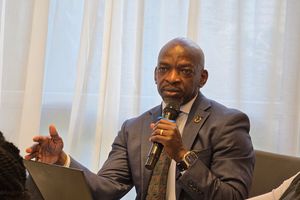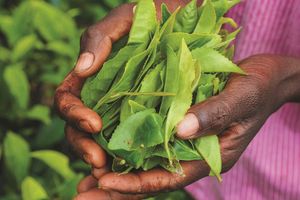Climate impacts on agriculture: Global experts debate solutions at Nairobi summit

Prime Cabinet Secretary Musalia Mudavadi addresses delegates during the 2025Consortium of International Agricultural Research Centres Science Summit at United Nations headquarters in Nairobi on April 7, 2025.
What you need to know:
- The summit opened against a backdrop of growing global hunger, with recent UN reports indicating that climate-related disruptions to food systems now affect over 800 million people worldwide.
Experts from around the world have gathered this week at the United Nations headquarters in Nairobi for the 2025 Consortium of International Agricultural Research Centres (CGIAR) Science Summit. The meeting brings together scientists, policymakers, and agricultural specialists to address growing concerns about food security in the face of climate change, biodiversity loss and inequality. However, questions remain about how effectively these high-level discussions will translate to on-the-ground improvements.
"The agriculture sector is under siege from shifting climate patterns, pollution, and the degradation of soil and land," Kenya's Prime Cabinet Secretary Musalia Mudavadi told attendees during Tuesday's session. While acknowledging the crisis, Mr Mudavadi also presented an optimistic vision: "With the right strategies, we can turn this around," he said, calling for approaches that balance productivity with environmental sustainability.
The summit opened against a backdrop of growing global hunger, with recent UN reports indicating that climate-related disruptions to food systems now affect over 800 million people worldwide.
Sustainability
Zainab Hawa, director general of the UN in Nairobi, emphasised the city's positioning as a hub for international cooperation, though critics note that previous similar gatherings have produced more statements than implementable solutions.
"Agriculture has an important role to play in climate science and sustainability," Hawa stated, highlighting connections between agricultural practices and climate impacts that have long been documented by researchers but have received inconsistent policy attention.
Ismahane Elouafi, executive managing director of CGIAR, introduced the organisation's new 2025–2030 Research Portfolio. "We must build bridges, not walls," Elouafi said, calling for inclusive approaches to agricultural innovation. The portfolio outlines research priorities for the organisation, though implementation will depend on securing consistent funding and overcoming political barriers that have hindered previous initiatives.
Regional perspectives featured prominently in discussions, with Mr Mudavadi describing Kenya's efforts in climate-smart agriculture.
Accompanied by State Department for Livestock and Development Jonathan Mueke PS, he referenced ongoing collaborations with research organisations to develop farming techniques that might simultaneously increase yields while reducing environmental impacts.
"These innovations are helping communities adapt, cut emissions, and strengthen food security," Mr Mudavadi stated, though farmers' representatives at the summit expressed concerns about whether new technologies would be accessible to smallholders who make up the majority of the agricultural workforce in many regions.
The summit's agenda reflects growing recognition that agriculture stands at a critical crossroads – responsible for approximately 23 per cent of greenhouse gas emissions, according to the Intergovernmental Panel on Climate Change, while also being among the sectors most vulnerable to climate impacts.
With extreme weather events increasingly disrupting food production, experts from various fields are debating whether conventional agricultural models can be reformed or must be fundamentally reimagined.
"This summit is not just about science, it's about sustainability," Mr Mudavadi told attendees. "We need bold, coordinated action to scale up sustainable farming, restore degraded lands, and empower farmers to become climate champions." His call for action echoes similar statements from previous conferences, raising questions about why progress has remained limited despite years of similar rhetoric.
Some participants highlighted success stories during panel discussions, including regenerative farming practices that improve soil health, agroforestry systems that protect biodiversity while providing multiple income streams, and water management techniques that help communities withstand droughts. However, others noted that scaling these approaches requires addressing economic and political barriers, including subsidies that often favour conventional, input-intensive agriculture.
The week-long summit includes workshops exploring issues ranging from precision agriculture technologies to indigenous knowledge systems, from crop breeding for climate resilience to value chains that better compensate farmers for sustainable practices. Civil society representatives emphasised that technological solutions alone will be insufficient without addressing power imbalances in food systems and ensuring that smallholder farmers have secure land rights and access to markets.
As the meeting continues, participants face the challenge of moving beyond theoretical frameworks to practical implementation strategies.
Previous international summits on agriculture and climate have generated ambitious declarations but inconsistent follow-through, with funding often falling short of commitments and political attention shifting to other priorities.
Agricultural experts at the summit acknowledged that transforming food systems requires navigating complex trade-offs between short-term productivity and long-term sustainability, between local food sovereignty and global market integration, and between traditional practices and new technologies. Finding the right balance – and ensuring that benefits are equitably distributed – remains one of the most significant challenges.
The gathering in Nairobi represents another attempt to align global efforts around sustainable agriculture at a time when climate impacts are accelerating. Whether it will catalyse meaningful change or join a long list of well-intentioned but ultimately limited initiatives remains to be seen. For millions of farmers already experiencing climate disruptions, the stakes could hardly be higher.
jmwangi@ke.nationmedia.com, vowade@ke.nationmedia.com


